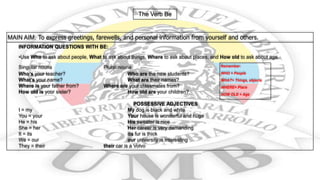
Verb be
- 1. MAIN AIM: To express greetings, farewells, and personal information from yourself and others. The Verb Be INFORMATION QUESTIONS WITH BE: •Use Who to ask about people, What to ask about things, Where to ask about places, and How old to ask about age. Singular nouns Plural nouns Who’s your teacher? Who are the new students? What’s your name? What are their names? Where is your father from? Where are your classmates from? How old is your sister? How old are your children? POSSESSIVE ADJECTIVES I = my My dog is black and white You = your Your house is wonderful and huge He = his His sweater is nice She = her Her career is very demanding It = its its fur is thick We = our our university is interesting They = their their car is a Volvo Remember: WHO = People WHAT= Things, objects WHERE= Place HOW OLD = Age
- 2. Use the verb be to give information about the subject of a sentence. The subject of a sentence can be a noun or a pronoun The teacher is Japanese. We’re Peruvian (noun) (Adjective) (pronoun) (adjective) Verb be: Forms Affirmative statements There are three forms of the verb be in the present tense: AM, ARE and IS. I am a student We are married Your are Carlos They are Canadian. He She is in the room It Contracted forms In speaking and informal writing, contract be with subject nouns and pronouns. I am a student = I’m a student. He is in the room = he’s in the room. You are late = you’re late Peter is a singer = Peter’s a singer. Negative contractions There are two ways to contract in negative sentences. He’s not Brazilian = He isn’t Brazilian They’re not teachers = they aren’t teachers. *There’s only one kind of negative contraction for I am not: I’m not.
- 3. Verb be: Yes/no questions; affirmative and negative short answers It’s common to answer yes/no questions with short answers, don’t use contractions with affirmative short answers. YES / NO QUESTION AFFIRMATIVE NEGATIVE Are you a salesperson? Yes, I am. No I’m not. Is he Italian? Yes, he is. No, he’s not / he isn’t Are they students? Yes, they are. No, they’re not / they aren’t KEY WORDS: Good morning Good afternoon Goog evening Good night Hello Hi Bye Good bye See you later See you soon See you tomorrow